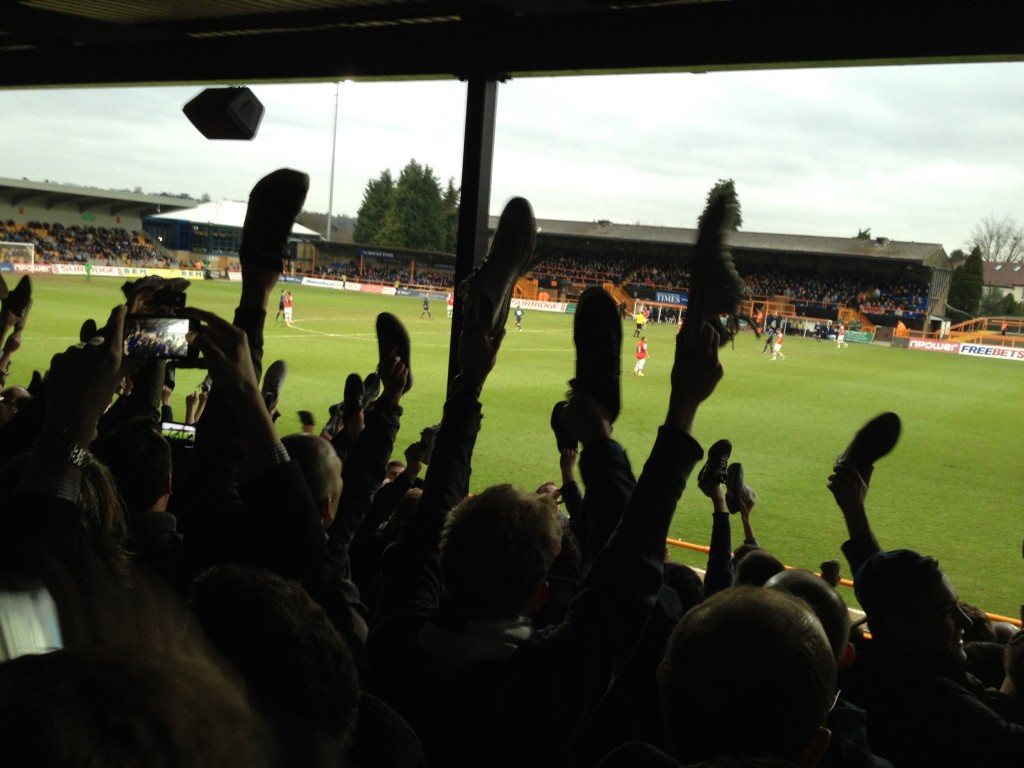1882, my season highlight: ‘shoes off…!’
I looked around me and saw elderly gentlemen and school children alike taking their shoes off and waving them in the air whilst singing “shoes off if you love Tottenham”.
This was the first experience of an away match for some. No doubt it was the first experience of a football match full stop for some of the children present – and what a memorable experience it was.
On April 22nd 2013, Tottenham Hotspur’s under-21 team played North London neighbours, Arsenal, at their home ground of Underhill. Whilst the Barclays U21 Premier League has attracted a fair amount of attention throughout the season, crowds for these type of “reserve” matches – even when local rivals meet – have historically been notoriously small. However, the 1882 movement ensured that this was not the case, and the majority of the 2,394 supporters were in the away end.
The Fighting Cock podcast started the 1882 movement with a flash-mob style event on 16 February 2012 as Tottenham’s youth side took on Charlton at the Valley in the 5th round of the FA Youth Cup. The aim? Unconditional support: to collectively sing for the entire game, harking back to days before the Premier League “when how loud you sang and how passionate you became wasn’t dependent on how well Tottenham were playing” (words from The Fighting Cock website).
The Charlton event was a roaring success, as a 200-strong group of fans sang loudly and proudly throughout and, whilst the team did not win, the young players appreciated the efforts and came over to applaud the group after the game.
Since then, 1882 has been present at the home games against Maribor and Panathanaikos in the Europa League, Coventry in the FA Cup, and Barcelona in the NextGen Series.
Underhill was something special, though, and proved that the movement can be effective with greater numbers; 1500+ Spurs fans singing, bantering, and hopping their way through the 90 minutes.
Such were the high jinx, that many were filming, and taking photos – some of which were used in the press the following day. I took the above photo on my iPhone, and I think it captures the atmosphere brilliantly.
The joy of being part of a large group of Tottenham Hotspur fans pulling in the same direction, all wanting the same thing is, in many ways, an antidote to the sense of entitlement felt at White Hart Lane across the past few seasons. 1882 allows you to forget the stresses and strains of daily life for 90 minutes, and enjoy being a football supporter for what it is – a tribal experience of togetherness and, most importantly, fun.
——————————————-
This article was part-inspired by the blind marathon runner, Simon Wheatcroft who – remarkably – uses his smart phone to help him run. The video below is most certainly worth a few moments of your time.
Carphone Warehouse, who commissioned this article, are offering some great prizes for people willing to submit a photo or video of an amazing personal achievement. This could be anything from overcoming a fear, a sporting achievement, something musical, or something totally different. So long as it’s your achievement, they want to hear about it: http://bit.ly/11iDTTx.
Look out for a give-away on my Twitter timeline later on.
